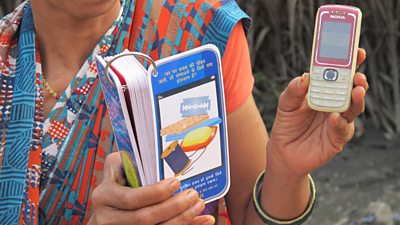Downloads
Insights further indicate that the use of Mobile Kunji improves beneficiary trust, comprehension and acceptance of information provided by health workers.
The study also found that those exposed to birth preparedness and complementary feeding messages through Mobile Kunji were more likely to practice simple doable actions related to these issues – even when taking contextual, social and demographic characteristics of respondents into account.
Publication date: November 2015
The project
Mobile Kunji, which means 'guide' or 'key' in Hindi, is an innovative audio visual job aid developed by ����ý Media Action for use by front line health workers.
There are two components to Mobile Kunji: a deck of 40 colour-coded cards with illustrations, and supporting audio available by dialling a mobile short code to reach an Interactive Voice Response (IVR) service.
Mobile Kunji is just one element of the ����ý Media Action, Bill and Melinda Gates Foundation (BMGF) funded project Shaping Demands and Practices (SDP). SDP is part of the Ananya programme (a collaboration between BMGF, Government of Bihar and nine grantees), which aims to reduce child mortality, improve maternal health and reduce infectious diseases in the state of Bihar.
Research approach
The study included quantitative surveys of 585 front line workers and 3,300 target beneficiaries (currently pregnant women and mothers with an infant aged 6-11 months), as well as qualitative discussions with the same target groups.
Regression analysis was used to establish the association between exposure to messages through Mobile Kunji and the practice of simple doable actions related to birth preparedness and complementary feeding. This enabled us to understand this relationship while taking into account social and demographic factors that might have affected respondents.
Key findings
- Beneficiaries exposed to Mobile Kunji reported greater levels of engagement than those who were not exposed: FLW visits took longer (20mins vs. 10mins); they were more likely to have asked questions during the visits (21% vs. 12%); and they were more likely to have discussed the information they got from the visit with someone else (35% vs. 22%).
- Beneficiaries exposed to birth preparedness messages through Mobile Kunji were almost three times more likely to have saved their FLW’s phone number, compared to those not exposed.
- Beneficiaries exposed to complementary feeding (CF) messages through Mobile Kunji were almost twice as likely to have fed their 6-11 month old with at least one infant and young child feeding (IYCF) food in the previous 24 hours. Those exposed also reported higher awareness of the correct month to initiate CF (62% vs. 49%).
- While those exposed to family planning messages through Mobile Kunji did report higher awareness of the correct gap to leave for birth spacing (68% vs. 59%) and slightly better knowledge of spacing methods (71% vs. 67%, named at least two) there was nothing to indicate that this translated to improved levels of practice.
Project context
����ý Media Action baseline research showed that reaching the project’s target audience through traditional forms of media would be difficult, with only 27% of young mothers able to access traditional media. Therefore the Shaping Demands and Practices (SDP) project combines face-to-face communication, Information Communication Technology (ICT), mass media, and community work.
As part of SDP, Mobile Kunji is aimed at empowering the front line health workers responsible for counselling millions of families. It enables them to take advantage of government health services and to adopt healthier behaviours.
As one front line worker from Khagaria said, “I will show the cards first, explain the cards and then play the audio. After I explain the concept and Dr Anita [the voice on the audio] says the same things, they trust us and she [the beneficiary] understands.”
Implications and impact
- Feedback on Mobile Kunji suggests it is highly valued by front line health workers both for its impact on their own confidence and knowledge, and for beneficiary trust, comprehension and acceptance of the information they are providing. Data also reveals Mobile Kunji is particularly effective with harder to convince beneficiaries.
- Findings indicate that the use of Mobile Kunji contributes to overall improved engagement during interactions between front line workers and beneficiaries.
- The study showed encouraging differences by exposure in levels of knowledge and supportive attitudes related to birth preparedness, complementary feeding and family planning. However, data also identified some gaps across the study in detailed knowledge of birth preparations and feeding practices as well as the presence of some unsupportive attitudes. Future work should look at how to continue to improve knowledge and challenge lingering myths.
